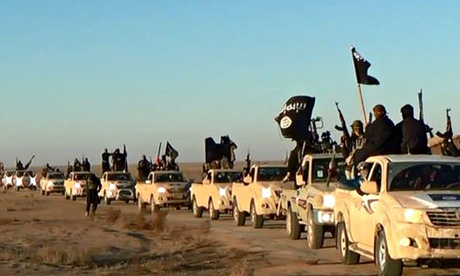A jednak ISIS rozpoczyna ofensywę na Bagdad. W ręce terrorystów wpadł już m.in. Tikrit., rodzinne miasto Saddama. Rząd al-Malikiego wystawia przeciwko nim dwie dywizje i sześć brygad zmechanizowanych - łącznie około 50 tys. żołnierzy. Mają powstrzymać organizację, która była zbyt radykalna nawet jak na standardy al-Kaidy. Mają przewagę liczebną i techniczną, ale będą walczyć na terenach sunnickich, co im źle wróży. Być może lepszym rozwiązaniem byłoby przyjęcie walki na przedmieściach Bagdadu, gdzie dużo szyitów a teren sprzyja zasadzkom i twardej obronie. Dotychczasowe doświadczenia nie są zachęcające. W Mosulu przed 800 bojownikami ISIS uciekło 30 tys. irackich żołnierzy - mniej więcej dwie dywizje. Zostawili na miejscu sporo sprzętu, w tym amerykańskie Blackhawki .
Al-Maliki tłumaczy klęskę sunnicką zdradą. Sunnicy żołnierze mieli porzucać stanowiska, bo nie lubią szyickiego rządu a ich oficerowie są w zmowie z rebeliantami. Z Mosulu rzeczywiście dochodzą informacje, że ISIS była wspierana przez bardziej umiarkowane sunnickie milicje oraz zwolenników rządzącej Irakiem za Saddama świeckiej, socjalistycznej partii Baas. Zacytujmy jednego z mieszkańców tego miasta:
"I'm so glad that we got rid of the Iraqi military forces, army and police. They were a curse on the city and its people. We have suffered a great deal since the US invasion in 2003, which brought only traitors and criminals to Iraq and to Mosul in particular. (...)
There was not a remarkable resistance by the Iraqi military forces and the Isis fighters put their hands on the city swiftly. They are in alliance now with Ansar al-Sunna and Ba'ath party fighters. We got statements by them confirming that they won't cause harm to any one and all the minorities will be protected by them.
They are welcomed. We are happy to have them rather than having Malki's bloody brutal forces. I feel we have been liberated of an awful nightmare that was suffocating us for 11 years. The army and the police never stopped arresting, detaining and killing people, let alone the bribes they were taken from detainees' families.My neighbours and I are waiting to hear that the other six Sunni protesting provinces have fallen to Isis fighters – then we can declare our own Sunni region like the three provinces in Kurdistan. There is no way to live with this awful successive governments that have been ruling Iraq since the invasion. They proved to be very sectarian and a complete failure in governing Iraq."
Dla odmiany głos oficera policji z Mosulu:
"It is obviously a conspiracy to hand Mosul over to Isis fighters and provide Maliki the opportunity to get his third mandate, against the will of the people.[I believe] the military has agreed with Maliki to hand over the Sunni provinces to Isis and, in return, Mosul will vote for Maliki as a prime minister for the third time.
It is really difficult to understand how the commanders of the land forces were so quick to move when a similar crisis first erupted in Ramadi, but they all fled when Isis attacked Mosul – even though there were only a few Isis fighters who could have been overcome easily.
[In Isis's first assault] there were only 500 fighters. Once they got to the city, they were joined by other Iraqi resistance groups, they went to the prisons and released all the prisoners who are fighting with them now. They are quipped of far better and advanced weapons than ours. If they fire a bullet, they can scupper a wall, not like our funny weapons, which are like kids' toys.The Isis fighters are from Syria, Afghanistan, Saudi Arabia and Iraq. When they entered the Tamouz neighbourhood in Mosul, we tried to resist them with RPGs [rocket-propelled grenades] and rockets. We were waiting for support from the army, which never came.All of a sudden, our commandos began to withdraw. We were more than 200 policeman in the office. I looked around and could only find eight. How can I fight Isis with eight policemen? We have pistols; they have PKC [machine guns].We held them off for five days but on the fifth day, an emergency forces unit based in one of the hotels in Mosul was hit and lots of military men were killed. The attack devastated the morale of the military forces. Any policeman who handed himself to Isis was killed immediately.
Isis fighters then confiscated army vehicles deserted by the military forces and drove them to the police headquarters. At first we thought they were military men; then they started to kill any policeman they saw. They are everywhere in the city and all its villages. The whole city is under their control now."
Maliki jest w dużej mierze sam sobie winny. Gdy Amerykanie się wycofali, przestał płacić sunnickim milicjom, które zwalczały al-Kaidę. Jego bezpieka uderzała w sunnickich polityków, więc sunnici (religijni i postsaddamowscy) sprzymierzyli się z ISIS.
Ps. najnowsze wiadomości dotyczące sytuacji w Iraku - na blogach Daily Telegraph i Guardiana

Brak komentarzy:
Prześlij komentarz